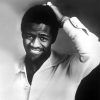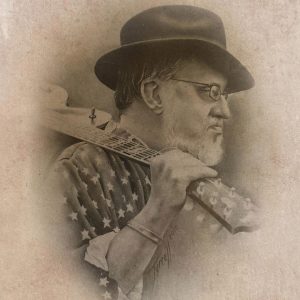calsfoundation@cals.org
Jim Dickinson (1941–2009)
Jim Dickinson was a musician, record producer, and author. Born in Little Rock (Pulaski County), he briefly lived in Chicago, Illinois, before settling in Memphis, Tennessee, where he got his musical start. Dickinson later worked with legendary figures in rock and soul music, including Sun Records producer Sam Phillips and producer Jerry Wexler, as well as Aretha Franklin, the Rolling Stones, and Bob Dylan. In the 1970s, Dickinson produced albums by legendary Memphis band Big Star and by the Replacements. He is also the father of Luther and Cody Dickinson of the North Mississippi All-Stars.
James Luther Dickinson was born on November 15, 1941, in Little Rock to Arkansas natives James Baker “Big Jim” Dickinson and Martha Huddleston Dickinson. At the age of seven, Dickinson moved with his family to Chicago, but they settled in Memphis in the summer of 1949. Dickinson lived only a few years in Little Rock, but he kept strong ties with Arkansas through family visits, and as a college student, he crisscrossed the state. It was in West Memphis (Crittenden County) that he first heard Howlin’ Wolf, and he honeymooned with his wife Mary Lindsay in Lonoke (Lonoke County).
Dickinson’s father was a salesman who sometimes took his son with him on trips through the Delta; he was also a heavy drinker. Neither of his parents encouraged his musical career, although Dickinson’s mother, a trained pianist who played in the Baptist church and gave music lessons, helped him develop his talent early on. As a teenager, Dickinson learned boogie-woogie and blues piano from Alec Tiel, an African American man who worked on his family’s property. Dickinson started as a piano player, but he became a multi-instrumentalist who could play drums and guitar in addition to keyboards.
Dickinson suffered from poor eyesight, which, combined with a rebellious streak, did not help him in school. Even so, he graduated from White Station High School in Memphis in 1960 and attended college, splitting his time between Baylor University and Memphis State (now the University of Memphis). Dickinson was a theater major at Baylor. A bohemian, he liked the program but not the ultra-religious and conservative culture at the school. At Memphis State, he majored in history and graduated from there in 1964.
Dickinson started playing music seriously in central Texas when he was at Baylor. In Waco, Dickinson avoided his dorm, did not study much, and explored drugs, alcohol, and sex. He visited local Black blues clubs and became a devotee of legends such as Big Bill Broonzy and Sister Rosetta Tharpe. He also became obsessed with bluesman Blind Lemon Jefferson, whose grave he visited in rural Texas on a trip with friends.
His love of the blues, combined with his own talent, launched him into the Memphis music scene of the early 1960s. He eventually worked with Bo Diddley, Sam Phillips at Sun Records, and many others who passed through the city. In 1964, Bill Justis invited Dickinson to Nashville to play on one of his recordings, but Dickinson preferred working in Memphis. With the Jesters, he recorded “Cadillac Man” in 1966, considered the last of the great Sun singles.
In 1969, Dickinson was invited to play with the Rolling Stones during sessions recorded at Muscle Shoals with Jerry Wexler producing. The sessions eventually found their way onto the Stones’ 1971 album Sticky Fingers. Dickinson is heard playing piano on the classic song “Wild Horses” and was featured in the film Gimme Shelter.
Dickinson found his greatest early success as the keyboard player for the Dixie Flyers, a group of Atlantic Records studio musicians. A memorable session involved them playing with Aretha Franklin in Miami for what became her Spirit in the Dark album. Dickinson did not like Miami, and he moved back to Memphis shortly after he completed his work with Franklin. The Dixie Flyers disbanded in 1971. Dickinson released his first solo album, Dixie Fried, in 1972.
Not long after the Dixie Flyers broke up, Dickinson was recruited by Ry Cooder to perform and record with him. They also toured together and later worked on film soundtracks such as Paris, Texas (1984).
In the 1970s, Dickinson also excelled as a producer, though the sessions were not always pleasant. He recalled that working on Memphis band Big Star’s Third/Sister Lovers in the fall of 1974 was a “painful experience,” given that the band and their record label were dissolving. Big Star, nevertheless, attained cult status for their 1970s “power pop.” Dickinson also worked with celebrated alternative rock favorite the Replacements. He produced their 1987 album Pleased to Meet Me, which featured Alex Chilton of Big Star on guitar and included a song about Chilton.
In addition to producing, Dickinson put out his own music throughout his career. Later in life, he played with Memphis bands Mudboy and the Neutrons, Panther Burns (with fellow Arkansas native Tav Falco), and Snake Eyes. He played on Bob Dylan’s comeback Time Out of Mind album, released in 1997. In the 1980s and 1990s, he also produced Toots and the Maytals, Mudhoney, Jason and the Scorchers, Mojo Nixon, and Screamin’ Jay Hawkins. In 1996, his sons Luther and Roy Dickinson formed North Mississippi All-Stars and went on to successful careers.
In the 1990s, Dickinson moved to Hernando, Mississippi, where he built a recording studio called Zebra Ranch, where he played with his sons and recorded his own music. Dickinson died on August 15, 2009, of heart failure in Memphis. He had been recovering from heart surgery in Methodist Extended Care Hospital when he died.
Dickinson was inducted into the Memphis Music Hall of Fame. In 2017, with assistance from English professor Ernest Suarez, his unfinished, posthumous memoir, I’m Just Dead, I’m Not Gone (named after one of his records), was published; it stops in the early 1970s before Dickinson, a natural and funny storyteller, could recount his time with Big Star, the Replacements, and others.
For additional information:
Dickinson, Jim. I’m Just Dead, I’m Not Gone. Jackson: University Press of Mississippi, 2017.
Escott, Colin, and Martin Hawkins. Good Rockin’ Tonight: Sun Records and the Birth of Rock ‘N’ Roll. New York: St. Martin’s, 1991.
“A Producers Epiphany: Jim Dickinson on Working with the Rolling Stones, Part 1 of 2.” https://www.youtube.com/watch?v=N2gZyTNKikc (accessed March 21, 2023). [see Related Video in sidebar]
“A Producers Epiphany: Jim Dickinson on Working with the Rolling Stones, Part 2 of 2.” https://www.youtube.com/watch?v=sx8X2Dtkuaw (accessed March 21, 2023). [see Related Video in sidebar]
Colin Edward Woodward
Richmond, Virginia



 I'm Just Dead, I'm Not Gone
I'm Just Dead, I'm Not Gone 



Comments
No comments on this entry yet.